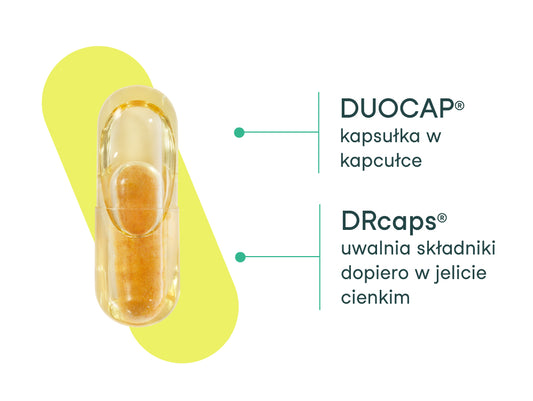
Is sugar really a "silent killer"? Let's check what the science says about how excessive consumption affects our health.
About 1,400 people die prematurely in Poland every year as a result of excessive consumption of sweetened drinks. Sugar takes 15 years of life away from these people , say experts from the Department of Analysis and Strategy of the National Health Fund 1 . Despite growing evidence that added sugar (in various forms) is linked to disease and shorter lives , its consumption remains high, especially in "affluent" countries. For comparison, in poorer developing countries, one person consumes on average about 12 kg of sugar per year 2 . An average Pole eats about 43 kg of sugar every year , according to data from the Central Statistical Office from 2020. It's not just about the sugar we buy in one-kilogram packages in the store 3 , but also about the one "hidden" in the composition of ready-made meals, cold meats, sauces and other store-bought products.
Okay, but is sugar really as bad as it is painted? Is he the main culprit of diseases such as diabetes, obesity and cancer ? And how much do we need to limit it? Let's check.
Sugar – do we need it?
It is often said that we need sweetened foods because they contain glucose , which is essential for humans . We need it for the proper functioning of the body and brain. However, glucose can be found not only in sugar . Vegetables, cereals, whole grains and even acidic fruits break down into glucose molecules in our body. This means we obtain it from various types of carbohydrates , not only simple ones such as sugar 4 . Moreover, in situations where there is a temporary shortage of carbohydrates, our body can produce glucose itself from other compounds (but this is a topic for a separate article).
Never in history has man consumed such amounts of sugar and sweet foods as he does now. Our ancestors only had fruit (which had a mainly sour taste before industrial agriculture became widespread in the world) and honey in limited quantities . Until the 20th century, sugar sprinkled in the form of small crystals was a luxury product in Europe and Poland and was not present on every table. 5 .
Nowadays, it is difficult to find a house without sugar. It can be present as white or brown sugar, molasses, agave syrup, date syrup, fructose syrup, maple syrup, corn syrup, etc. All of this is considered "added sugar" and is not necessary for the human body to survive. And the more similar sweeteners we eat every day, also in store "ready-made" products, the more we expose our body to diseases and disorders. 6 .
How does sugar affect health?
There are plenty of studies on the relationship between sugar consumption and the risk of various diseases, although critics point out that "association" does not mean cause and effect 7 . In other words, if people who eat a lot of sugar are more likely to have cancer than people who cut back on sweets, it doesn't mean that sugar is the main culprit. Indeed, in research it is often difficult to distinguish whether the cause of the disease is sugar itself , or perhaps it is a matter of unnecessary calories it provides, or whether other unhealthy eating habits that often occur alongside sweets "addiction" played a large role - e.g. fast food style.
However, there is another reason that may have a significant impact on the results of scientific research on the harmfulness of sugar (or lack thereof). This is the sugar lobby 8 . Sugar production is a huge business (also in Poland). Globally, it is worth over $100 billion a year 9 . Some research is directly financed by producers. Scientists have estimated that such studies are 8 times more likely to draw conclusions favorable to their funder 10 than in the case of "independent" research.
In any case, the mere fact that the consumption of sweetened products is associated with a higher incidence of lifestyle diseases seems to be sufficient to limit their consumption. Let's look at the existing scientific evidence one by one.
How does sugar affect the brain?
Studies of the brains of deceased people clearly indicate that high levels of glucose (sugar) accompany damaged brain cells . “Healthy” areas of the brain do not have elevated sugar levels 11 . Another study, which also analyzed blood samples collected from people in the 19 years before death, found that people with Alzheimer's disease had the highest levels of glucose in the brain . Moreover, the test results of these people did not indicate diabetes. This means that their brain sugar levels rose gradually over years, even before any symptoms of brain damage became visible 12 . It can therefore be concluded that diets high in sweetened foods increase the risk of neurodegenerative diseases , including Alzheimer's.
Does sugar cause depression?
Various scientific studies show that the consumption of sweetened drinks (even if it is only 1 can a day) leads to an increase in inflammation markers in the body . When consumed regularly, they contribute to chronic inflammation 13,14,15 , which underlies many diseases, including depression 16 . Frequent consumption of processed carbohydrates (e.g. baked goods, cookies) also has similar effects. 17,18,19 .
Does sugar cause type 2 diabetes?
Type 2 diabetes is a disease in which a person has high levels of glucose (sugar) in the blood. And it might seem that the connection between higher sugar consumption is obvious. However, the current scientific evidence does not support the conclusion that sugar consumption causes diabetes 20.21 . However, it is undoubtedly one of the elements contributing to the development of this disease. Obese people have an increased risk of type 2 diabetes, and the consumption of sugar (in various forms) increases the amount of calories consumed, which increases the risk of overweight and obesity. 22 .
Does sugar feed cancer?
A direct link between sugar consumption and cancer has not yet been proven, but an indirect link can be traced.
You may hear the opinion that sugar feeds cancer cells , but this is only half true - glucose (including sugar) feeds all cells in our body, not only cancer cells. Sugar stimulates the secretion of insulin in our body, which in turn stimulates cell growth and division . Cancer is nothing else than the uncontrolled proliferation of cells and their mutations 23 . High insulin levels accelerate these processes , and a rapidly growing tumor needs more fuel, i.e. glucose.
Another mechanism that indirectly links sugar to the development of cancer is obesity . Sugar contains a lot of calories and, if consumed in excess, leads to obesity. Obese and overweight people, in turn, have a greater risk of developing 11 types of cancer , including breast, colon, stomach and ovarian cancer. 24 !
Does sugar cause tooth decay?
It would be difficult to dispute the negative impact of sugar here . Sweet foods are a breeding ground for dangerous bacteria in our mouth, which, when they eat sugar, secrete acid. The acid, in turn, destroys tooth enamel. The more sugars we eat, the more "harmful" bacteria multiply and the more acid they secrete. As a result, tooth decay occurs 25 .
Is sugar addictive?
One study on mice showed that they developed a mechanism similar to sugar addiction. This conclusion has been disseminated in the form of the claim that sugar has an effect on the human brain like cocaine 26 . However, other researchers point out that in the laboratory, mice showed signs of sugar addiction only when they had limited access to it - for 2 hours a day. And in conditions where they could eat sugar at any time, they did not behave like addicts 27 .
On the other hand, the fact is that sugar activates the reward system in the brain (just like drugs) and causes the release of dopamine, a neurotransmitter called the "happiness hormone". It is true that the effect wears off quickly, and larger doses may be needed to feel it again 28 . It is also worth adding that not only sugar, but also other high-calorie and fried foods cause the release of dopamine, which is why we may feel a greater desire for them.
How much sugar can you eat a day without harm to your health?
As can be seen from the arguments mentioned above, sugar is not "evil incarnate" , but if we want to live a healthy and long life without diseases, it is worth limiting its consumption. WHO and the National Nutrition Center recommend that no more than 10% of your energy needs come from sugar 29 . Assuming that we consume 2,000 kcal a day, sugar should constitute no more than 10 teaspoons . It's about added sugar, but not only the sugar we add to tea or coffee. Sugar is currently found in virtually every ready-made product in stores, e.g. cold meats, canned goods, ready-made meals, and sauces. And Poles consume most sugar in the form of sweetened drinks.
We will gain even more health benefits if we reduce the amount of sugar to 5% of our daily calorie limit30 . That is, up to 5 teaspoons a day. The fewer sugar cubes you eat every day, the more you contribute to your overall health.
Bibliography:
- Report "Sugar, obesity - consequences", Literature review, estimates for Poland, Department of Analysis and Strategy of the National Health Fund, February 21, 2019, nfz.gov.pl.
- OECD-FAO Agricultural Outlook 2021-2030, OECD Library, July 5, 2021, oecd-ilibrary.org.
- “After yeast and soap came the sugar panic. Stores introduce limits”, banker.pl, July 21, 2022.
- Beth Sissons, “Does the body need sugar? How much to consume”, March 29, 2021, medicalnewstoday.com.
- Wojtek Duch, “Sugar was worth its weight in gold in the Second Polish Republic. Thousands of workers earned as much per day as a kilogram of sugar, July 24, 2022,historia.org.pl.
- Longina Kłosiewicz-Latoszek, “How much sugar is safe for health?”, National Center for Nutrition Education, accessed August 8, 2022, ncez.pzh.gov.pl.
- Jessica Brown, “Is sugar really bad for you?,” bbc.com, May 1, 2020
- Silvia Lazzaris, “DOES SUGAR DAMAGE OUR HEALTH?”, Food Unfolded, October 30, 2020, foodunfolded.com.
- M. Shahbandeh, “Sugar Industry - statistics & facts”, statista.com, June 10, 2022.
- Maira Bes-Rastrollo et al. (2013). Financial Conflicts of Interest and Reporting Bias Regarding the Association between Sugar-Sweetened Beverages and Weight Gain: A Systematic Review of Systematic Reviews. PLoS Medicine. Accessed on 10 October 2020.
- Xu J, Begley P, Church SJ, Patassini S, McHarg S, Kureishy N, Hollywood KA, Waldvogel HJ, Liu H, Zhang S, Lin W, Herholz K, Turner C, Synek BJ, Curtis MA, Rivers-Auty J, Lawrence CB, Kellett KA, Hooper NM, Vardy ER, Wu D, Unwin RD, Faull RL, Dowsey AW, Cooper GJ. Elevation of brain glucose and polyol-pathway intermediates with accompanying brain-copper deficiency in patients with Alzheimer's disease: metabolic basis for dementia. Sci Rep. 2016 Jun 9;6:27524.
- An Y, Varma VR, Varma S, Casanova R, Dammer E, Pletkova O, Chia CW, Egan JM, Ferrucci L, Troncoso J, Levey AI, Lah J, Seyfried NT, Legido-Quigley C, O'Brien R, Thambisetty M. Evidence for brain glucose dysregulation in Alzheimer's disease. Alzheimer's Dementia. 2018 Mar;14(3):318-329. doi: 10.1016/j.jalz.2017.09.011.
- Aeberli I, Gerber PA, Hochuli M, Kohler S, Haile SR, Gouni-Berthold I, Berthold HK, Spinas GA, Berneis K. Low to moderate sugar-sweetened beverage consumption impairs glucose and lipid metabolism and promotes inflammation in healthy young men: a randomized controlled trial. Am J Clin Nutr. 2011 Aug;94(2):479-85.
- Bruun JM, Maersk M, Belza A, Astrup A, Richelsen B. Consumption of sucrose-sweetened soft drinks increases plasma levels of uric acid in overweight and obese subjects: a 6-month randomized controlled trial. Eur J Clin Nutr. 2015 Aug;69(8):949-53.
- Jameel F, Phang M, Wood LG, Garg ML. Acute effects of feeding fructose, glucose and sucrose on blood lipid levels and systemic inflammation. Lipids Health Dis. 2014 Dec 16;13:195.
- Lee CH, Giuliani F. The Role of Inflammation in Depression and Fatigue. Front Immunol. 2019 Jul 19;10:1696.
- Spreadbury I. Comparison with ancestral diets suggests dense acellular carbohydrates promote an inflammatory microbiota, and may be the primary dietary cause of leptin resistance and obesity. Diabetes Metab Syndr Obes. 2012;5:175-89.
- Buyken AE, Flood V, Empson M, Rochtchina E, Barclay AW, Brand-Miller J, Mitchell P. Carbohydrate nutrition and inflammatory disease mortality in older adults. Am J Clin Nutr. 2010 Sep;92(3):634-43.
- Dickinson S, Hancock DP, Petocz P, Ceriello A, Brand-Miller J. High-glycemic carbohydrate index increases nuclear factor-kappaB activation in mononuclear cells of young, lean healthy subjects. Am J Clin Nutr. 2008 May;87(5):1188-93.
- World Health Organization (2015). Guideline: sugars intake for adults and children. Accessed August 9, 2022.
- Dietary Guidelines Advisory Committee (2020). Scientific Report of the 2020 Dietary Guidelines Advisory Committee: Advisory Report... US Department of Agriculture, Agricultural Research Service, Washington, DC. Accessed August 9, 2022.
- DiabetesUK. Sugar and Diabetes. diabetes.org.uk, Accessed August 9, 2022.
- Vander Heiden MG, Cantley LC, Thompson CB. Understanding the Warburg effect: the metabolic requirements of cell proliferation. Science. 2009 May 22;324(5930):1029-33.
- Kyrgiou M, Kalliala I, Markozannes G, Gunter MJ, Paraskevaidis E, Gabra H et al. Adiposity and cancer at major anatomical sites: umbrella review of the literature BMJ 2017.
- Sheiham A, James WP. Diet and Dental Caries: The Pivotal Role of Free Sugars Reemphasized. J Dent Res. 2015 Oct;94(10):1341-7.
- Dinicolantonio, James & O'Keefe, James & Wilson, William. (2017). Sugar addiction: Is it real? A narrative review. British Journal of Sports Medicine. 52. bjsports-2017. 10.1136/bjsports-2017-097971.
- Margaret L. Westwater et al. (2016). Sugar addiction: the state of the science. European journal of nutrition. Accessed on 25 October 2020.
- Héloïse Hamelin, Ghislaine Poizat, Cédrick Florian, Miron Bartosz Kursa, Elsa Pittaras, Jacques Callebert, Claire Rampon, Mohammed Taouis, Adam Hamed, Sylvie Granon, Prolonged Consumption of Sweetened Beverages Lastingly Deteriorate Cognitive Functions and Reward Processing in Mice, Cerebral Cortex, Volume 32, Issue 7, 1 April 2022, Pages 1365–1378.
- Diet, nutrition and the prevention of chronic diseases: report of a joint WHO/FAO expert consultation. WHO Technical Report Series 916, Geneva, 2003.
- Longina Kłosiewicz-Latoszek, op. cit.


What makes our capsule stand out?
The nikalab capsule impresses not only with its appearance, but also with its operation. We used two innovative...








